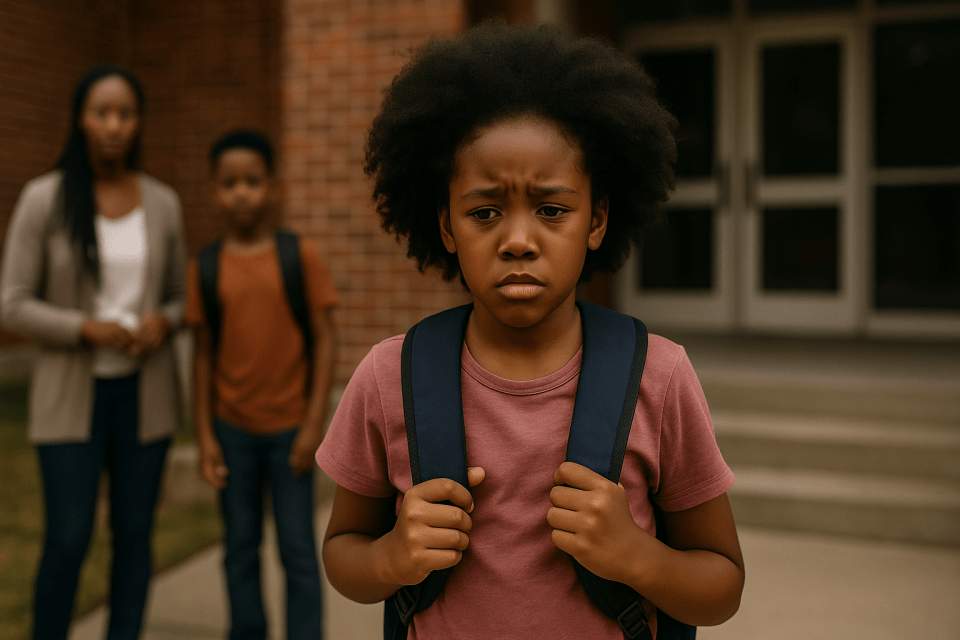As summer fades and backpacks get zipped up, many parents brace for the annual back-to-school rush. But for Black families, this season often carries more than the usual jitters. Beneath the excitement lies a powerful undercurrent of anxiety, one that’s not just about new teachers or harder classes, but about microaggressions, bias, and navigating predominantly white school systems that aren’t always built for our children.

The stakes are high. Studies show that Black youth face significantly higher rates of anxiety, depression, and even suicide compared to their white peers. But there’s good news: with the right knowledge, strategies, and support, Black parents can equip their children to walk into school with pride, power, and peace of mind.
“From as early as age six, Black children experience microaggressions, those subtle digs or dismissals that slowly chip away at their confidence.”
The Heavy Burden Black Children Carry to School
Back-to-school stress is universal, but research reveals that Black children often shoulder heavier emotional loads. According to national data, suicide rates among Black children under 13 are nearly twice as high as those of white children. Much of this stems from race-related stress.
From as early as age six, Black children experience microaggressions, those subtle digs or dismissals that slowly chip away at their confidence. Add in disparities in school discipline, over-policing, and mental health stigma, and it’s clear why this season can feel overwhelming.
Psychologists call this “racial battle fatigue, “a chronic, emotionally draining toll that racism takes on a child’s well-being. And it doesn’t wait until high school. It begins in kindergarten classrooms, lunch tables, and even on the playground.
Breaking the Cycle: How Black Parents Can Protect & Prepare Their Children
To help our children thrive, we must go beyond just shopping for school supplies; we need to support their emotional health. Thankfully, Vinay Saranga, M.D., Adult and Child Psychiatrist at The North Carolina Institute of Advanced NeuroHealth, offers compassionate, practical guidance tailored to families like ours.
For Kids:
- Normalize Their Feelings
Let your child know it’s okay to feel nervous. Anxiety is normal, especially with big changes. Validate their emotions instead of rushing them away. - Practice Routines Early
Start your school-day rhythm at least a week before the first day. Predictability helps calm the nervous system. - Use “Preview Days”
Walk through the school building together. Meet teachers. Locate restrooms. These steps reduce fear of the unknown. - Create a “Worry Plan”
Let your child draw or write their fears (e.g., “What if I get lost?”) and walk through solutions (“I can ask a teacher”). - Teach Calming Tools
Give them a “calm-down” object for their backpack, practice deep breathing, or teach grounding exercises like naming five things they can see.
For Parents:
- Skip the Over-Reassurance
Instead of saying “You’ll be fine,” ask, “What part are you most nervous about?” Listen fully. - Check Your Own Anxiety
Kids mirror what they see. If you’re stressed, they will be too. Start your day grounded. - Prep Ahead
Eliminate morning chaos by setting out clothes, packing lunches, and charging devices the night before. - Celebrate the Brave Moments
Acknowledge their courage when they step outside their comfort zone. Confidence builds with every small success. - Offer a Decompression Window
After school, allow at least 20 minutes before diving into homework. Let them reset emotionally.
The Systemic Roots of Anxiety: What Black Families Must Know
Research shows that Black students are more likely to be punished, even when exhibiting the same behaviors as their white peers. Teachers often misinterpret anxiety in Black youth as aggression or defiance.
Even more alarming? Black students often lack access to culturally competent counselors or psychologists at school. When help is available, it’s not always safe to access. One study found that Black boys who valued self-reliance were 77% less likely to use school-based mental health services.
That’s why parents must advocate early. Ask if your child’s school has mental health professionals who reflect your community or have training in racial equity.
We Can’t Afford to Wait
Back-to-school anxiety is not just a phase; it’s a window into a child’s emotional world. For Black children, it’s often compounded by historical and systemic challenges. But with intentional parenting, culturally responsive care, and the right tools, we can shift the narrative.
Let’s raise emotionally resilient, self-aware kids who walk through those school doors knowing exactly who they are and who they come from.
FAQ: Back-to-School Anxiety in Black Children
Q: How can I tell if my child’s school anxiety is serious?
A: Watch for signs like withdrawal, stomach aches, trouble sleeping, or refusing to go to school. If it persists, consult a child therapist or school counselor.
Q: What should I do if I think my child is being treated unfairly at school?
A: Document incidents, speak to teachers and administrators, and advocate for restorative justice practices. Don’t hesitate to involve school board advocates or community groups.
Q: Can anxiety in Black children be mistaken for behavioral issues?
A: Yes. Black children are often misdiagnosed or punished rather than supported. Make sure educators understand how anxiety presents in your child and push for a whole-child approach.
Q: Are there culturally responsive therapists available for Black youth?
A: Yes, but they may be harder to find. Start with resources like Therapy for Black Girls, Clinicians of Color, or the Association of Black Psychologists websites.
Q: What’s one thing I can do today to help my child feel more secure?
A: Create a worry plan together. Let them share their fears and come up with comforting routines and solutions.
comments +